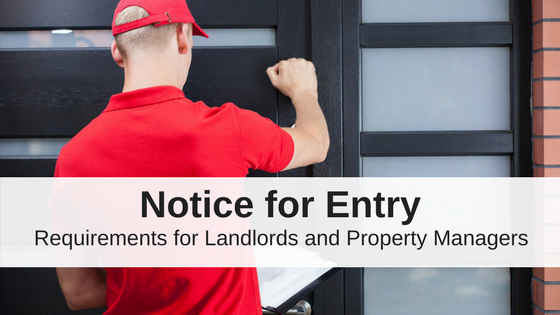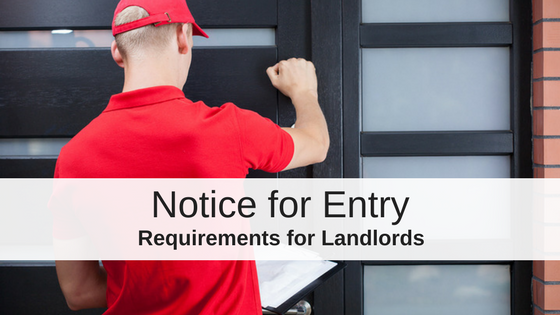
Landlords and property managers are required to respect their tenants homes and provide them with a peaceful environment, known as the implied covenant of quiet enjoyment. Unsolicited visits, whether from the owner or maintenance personnel, can be annoying for your renters and disturb their quiet enjoyment.
However, there are plenty of legitimate reasons an owner or maintenance person will be knocking on the door of a rental home seeking entry. As long as a landlord is visiting the property for a legal reason, like an inspection or repair, and as long as proper notice is given, seeking entry into a rental property, whether the renter gives you permission or not is often well within your rights as a landlord.
When is entering a rental property allowed?
Let’s consider this situation that happened to me a few years ago, regarding my right to enter a tenant’s property for a maintenance issue:
I received a call from my tenant about a leak in the roof coming through into the garage. I called a roofing company immediately because I realize that water damage can add up fast not to mention the whole potential mold issue.
The roofer went over to the property that same morning only to be shooed away by the tenant to come back later. The tenant was supposed to call the roofer back to schedule a time that was more convenient. A week went by, however, and the tenant made no attempt to call the roofer, meaning water was leaking into the garage for a week!
This incidence has brought to the forefront the question of required landlord notices.
- Did I have to be so accommodating for my renter’s schedule if it risked water damage to the property?
- How much notice is required to enter the property under this fairly emergent situation?
Let’s take a look at notice requirements for landlords, including notice for entry requirements, notice to vacate without cause, notice to vacate with cause, notice for rent increase requirements, and how one must give notice.
Please note that this particular article is focused on Oregon’s law but this site can give you specifics on your states’ requirements.
Notice for Entry Requirements
Reasons that a landlord may be granted entry into a rental property usually fall under the following circumstances; to Deal with an emergency, inspections, repairs/improvements, show property if selling, and during tenants extended absence.
Dealing with my current situation is what I would consider somewhat of an emergency. It hadn’t been raining much but the attic is wet and where there is moisture there could certainly be mold growth. In the state of Oregon a 24 hour notice is required under any of the above mentioned situations excluding emergency situations.
Notice To Vacate Requirements Without Cause
In most cases a landlord does not need to give their tenant a reason to vacate as long as they are not acting on discriminatory motives or as an act of retaliation. As a landlord you must give a written notice to vacate.
If the tenant has been at the property for less than a year 30 days notice is required. In Oregon, if the tenant has been there for more than a year 90 days notice must be given, according to the recent House Bill 4143. The exception the 90 day rule is if the property is sold and then 30 days is all that is required.
Your landlord may legally provide less notice if the tenant has not paid rent, if they have broken other terms of the rental agreement, or if they are breaking the law.
Tenants who want to get out of a month-to-month rental agreement also need to give a written 30 day notice unless the landlord has committed a major breach in the rental agreement or there is something that has an effect on the tenants health or safety.
Notice To Vacate Requirements With Cause
When a tenant has not paid the rent landlords in Oregon can serve a pay or quit notice after rent is eight days late, this gives the tenants 3 days to pay rent or move, or serve the notice after rent is five days late and this gives the tenants six days to pay or move.
Under a month-to-month rental agreement a 30-day eviction notice for cause can be filed. The cause for the notice must be for either breaking the rental agreement or breaking the law.
The notice must state the reasons for eviction and that the rental agreement will end at least 30 days after notice was given.
If the problem can be resolved by making repairs, paying damages, or in other ways the notice has to say that an eviction can be avoided by dealing with the problem within 14 days.
If the problem has not been taken care of then an eviction case must be filed with the court after the 30-day notice period has elapsed. In extreme cases a landlord can give a 24-hour written notice to end tenancy.
Extreme cases include; purposefully injuring someone, intentionally damaging the property, prostitution, violence, manufacture or delivery of drugs, intimidation and burglary.
Notice For Rent Increase Requirements
Oregon has some of the more renter-friendly rent increase notice requirements in the country.
In Oregon, unless the rental agreement specifies otherwise, the landlord must generally give the same amount of notice to change the monthly rent payment as would be given to end the tenancy, or notice to vacate.
If a lease is signed and rent is not on a month-to-month basis then the landlord cannot increase the rent until the lease period is over unless specified differently in the lease. Once again, landlords cannot discriminate when raising their rents or be doing it as an act of retaliation.
Giving Notice Requirements
The law requires that notices be served in very specific ways. If the notice is served incorrectly it will have no effect.
Notices can be served through personal delivery or by first class mail. If notice of a for-cause eviction is given by mail, the tenant would get three extra days to correct the cause in the notice and the termination of the tenancy would be extended by three days to account for mail time.
A 3 day or 6 day notice for not paying rent is considered to be served on the day it is mailed to the tenant and must also be attached securely to the main entrance of the rental property. The same is true for a 24-hour notice of termination for extreme cases.







Great Article!
You added many types of information that you share.After reading this article, I learn more info that you include into your blog.Thanks for sharing…..
Great post, learned a lot.. thanks you for posting!
(g) 90 Day No Cause Notices: In Portland (only), No Cause Notices must be served not less
than 90 days prior to the stated termination date, or the time period designated in the parties’
rental agreement, whichever is longer. This means that the 30 and 60 day No Cause Notices
established by the Oregon Residential Landlord and Tenant Act (the “ORLTA”) have been
significantly extended.
Remember it is still 60 day No-Cause Notices everywhere in Oregon, the exception being Portland Oregon.
Thanks Lori!
Such a Great read! very informative and helpful. A must read for tenants, landlords and property managers. Thanks for the post!
I had a year lease that went month to month. Now the landlord has given my family 30 days to move out. I am unable to find a home for my family. Is there anything or anybody I can talk to so they can help me out?